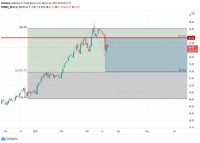|
Opalesque Industry Update - On Wednesday (Feb-24), U.S. financial regulator Securities and Exchange Commission (SEC) voted to impose restrictions on short selling with the aim of promoting market stability and preserving investor confidence. This alternative uptick rule is designed to restrict short selling from further driving down the price of a stock that has dropped more than 10% in one day. It will enable long sellers to stand in the front of the line and sell their shares before any short sellers once the circuit breaker is triggered, an SEC press release said. The approved alternative uptick rule (Rule 201) imposes restrictions on short selling only when a stock has triggered a circuit breaker by experiencing a price decline of at least 10% in one day. At that point, short selling would be permitted if the price of the security is above the current national best bid. The rule will become effective 60 days after the date of publication of the release in the Federal Register, and then market participants will have six months to comply with the requirements. SEC chairman Mary Schapiro said: "The rule is designed to preserve investor confidence and promote market efficiency, recognizing short selling can potentially have both a beneficial and a harmful impact on the market. It is important for the Commission and the markets to have in place a measure that creates certainty about how trading restrictions will operate during periods of stress and volatility." The uptick rule generally prohibits short selling of securities except on an uptick. The rule was defined by the SEC which summarized it: "Rule 10a-1(a)(1) provided that, subject to certain exceptions, a listed security may be sold short (A) at a price above the price at which the immediately preceding sale was effected (plus tick), or (B) at the last sale price if it is higher than the last different price (zero-plus tick). Short sales were not permitted on minus ticks or zero-minus ticks, subject to narrow exceptions." The rule went into effect in 1938 and was removed when Rule 201 Regulation SHO became effective in 2007. In 2009, the reintroduction of the uptick rule was widely debated, and proposals for a form of its reintroduction by the SEC went into a public comment period last year (Source). Short selling is the practice of selling a security or stock that an investor does not own or has borrowed with the intention of buying them back when prices declined. Short selling has long aroused suspicion of driving down the price of a security or to accelerate a declining market in a security. The deeply divided SEC voted 3-2 in favor of the new rule with the two Republican members dissenting, according to WSJ.com. Commissioner Kathleen Casey, former an aide to Senator Richard Shelby, Republican of Alabama, said the rule would limit legitimate short sales without good evidence any action was needed. She added that critics of short sales are likely to loudly demand more rules if and when the market again came under selling pressure. Another Republican commissioner Troy Paredes, former law professor at Washington University in St. Louis warned the new rule would limit market liquidity as he questioned whether it would improve investor confidence. But not everybody is happy with the SEC decision. The Managed Fund Association (MFA) said the restrictions were not supported by empirical data. The group said that while it supports the fight against manipulative short selling, this should not be confused with legitimate short selling. “In particular, most market observers agree that price declines and decreased investor confidence during the financial crisis were caused by the sudden and drastic changes in economic fundamentals, including the perceived insolvency of certain companies, and not by any short selling activity,” the MFA said in a statement. James Angel, a finance professor at Georgetown University in Washington, who has served as an adviser to stock exchanges criticized the new rule and described it as just providing “political cover to the SEC so they can say they did something… Nobody is going to be happy,” he said. For their part, EU lawmakers have been calling for stricter restrictions on speculators and short-sellers. Michel Barnier, EU financial markets chief, proposed a ban on naked short selling for alternative investment funds during the 16-Feb meeting of the 27 finance ministers of the EU in Brussels (see Opalesque Exclusive: Short-selling creates uproar on both sides of the Atlantic here). Last week, the Austrian Financial Market Authority extended its ban on the naked short selling of a number of financial firms.. In Nov-09, the UK government allowed the Financial Services Authority (FSA) to prohibit or require disclosure of short selling activities. An independent study made by the MFA showed that UK public short-sale disclosure rule would lead to lower rates of return and make it more expensive and difficult for all participants to invest in equity markets. The study said that the existing short sale disclosure regime in effect in the UK has caused bid-ask spreads for UK stocks subject to disclosure to widen by over 45% - making purchases and sales of those stocks more expensive for investors. In contrast, spreads for UK stocks exempt from short sale disclosure rules increased by only 2%, and spreads of similar US stocks materially decreased during the UK short disclosure regime (January 17, 2009 - present). – KM – |
Industry Updates
SEC orders short selling restrictions to promote market stability and preserve investor confidence
Thursday, February 25, 2010
|
|





 RSS
RSS







